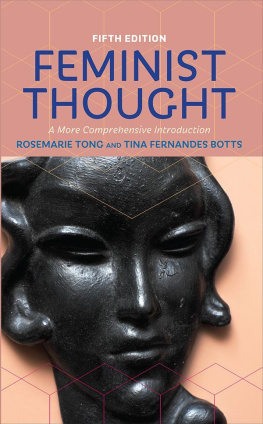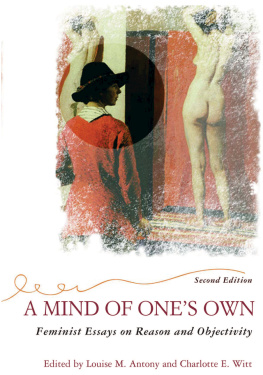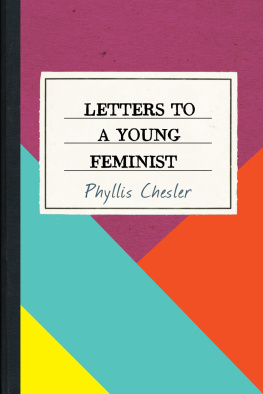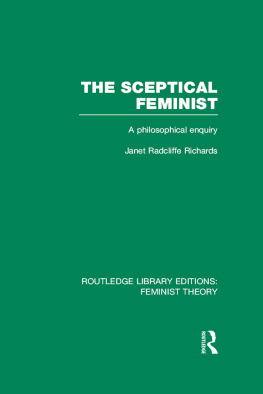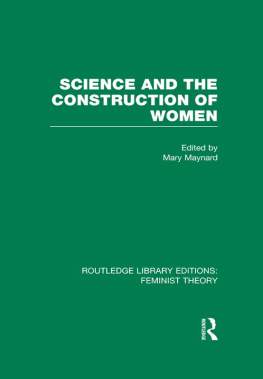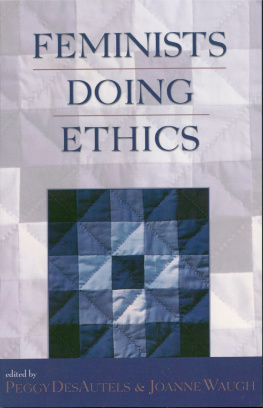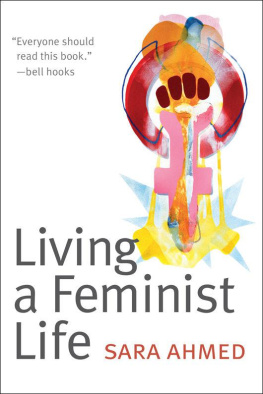Chapter 2 draws from material previously published in Rosemarie Tong, Feminine and Feminist Ethics (Belmont, CA: Wadsworth, 1982).
Chapters 58 draw from material previously published in Lawrence J. Kaplan and Rosemarie Tong, Controlling Our Reproductive Destiny: A Technological and Philosophical Perspective (Cambridge: MIT Press, 1994).
First published 1997 by Westview Press
Published 2018 by Routledge
711 Third Avenue, New York, NY 10017, USA
2 Park Square, Milton Park, Abingdon, Oxon OX14 4RN
Routledge is an imprint of the Taylor & Francis Group, an informa business
Copyright 1997 Taylor & Francis
All rights reserved. No part of this book may be reprinted or reproduced or utilised in any form or by any electronic, mechanical, or other means, now known or hereafter invented, including photocopying and recording, or in any information storage or retrieval system, without permission in writing from the publishers.
Notice:
Product or corporate names may be trademarks or registered trademarks, and are used only for identification and explanation without intent to infringe.
Library of Congress Cataloging-in-Publication Data
Tong, Rosemarie.
Feminist approaches to bioethics : theoretical reflections and
practical applications / Rosemarie Tong.
p. cm.
Includes index.
ISBN 0813319544.ISBN 0813319552 (pb)
1. Human reproductive technologyMoral and ethical aspects
2. Feminist ethics. 3. Medical ethics. I. Title.
RG133.5.T65 1997
176dc20
9643491
CIP
ISBN 13: 9780813319551 (pbk)
Many people have helped me think through the issues in this book but two deserve particular mention: Susan Peppers, a philosophy graduate student at the University of Pennsylvania, and Anna M. Kirkland, a graduate student in the Department of Government and Foreign Affairs at the University of Virginia. Susans critical comments and good stylistic suggestions are especially apparent in , and Annas skills as a research assistant, manuscript editor, and philosophical thinker enhanced some of the content and form of the manuscript as a whole. I also want to thank all my typistsJean Newman, Pat Richart, and Frances Alexanderand my copy editor, Christine Arden. Each of them suffered though many a revision with me. Finally, I want to thank Spencer Carr, Cindy Rinehart, and Melanie Stafford of Westview Press. Each of them is an extraordinary editor and an exceptionally supportive human being. Without their persistent encouragement and long-suffering patience, I would not have brought this manuscript to term.
Rosemarie Tong
For a long time now, I have struggled to articulate what a feminist approach to bioethics is and how such an approach to bioethics differs from a nonfeminist one. In are classical virtue-centered ethics (Aristotle), utility-oriented ethics (Jeremy Bentham and John Stuart Mill), duty-focused ethics (Immanuel Kant and W. D. Ross), sentiment-motivated ethics (David Hume), law-based ethics (discussed under the rubric of Natural Law), and contract-grounded ethics (John Rawls). Among the alternative traditions I discuss are contemporary virtue theory (Alasdair MacIntyre), contemporary sentiment theory (Larry Blum), existentialism (Jean-Paul Sartre), communitarianism (Michael Sandel, Charles Taylor, Roberto Unger, and Michael Walzer), pragmatism (John Dewey and William James), conceptualism (Robert L. Holmes), and communicative ethics (Jrgen Habermas and Richard Rorty).
Although feminists are eager to distinguish their approaches to ethics from those of nonfeminists, they do not wish to reject all the moral principles, concepts, and virtues that have guided the Western tradition for centuries. Even if it were possible for feminists to interpret ethics entirely de novo , it would be very foolish for them to do so. For all their flaws, the Principle of Utility and the Categorical Imperative, for example, have much to recommend them. After all, who does not think it is important to minimize pain and to maximize pleasure, to promote individual and societal well-being, to treat each person as worthy of equal respect and consideration, and to do ones duty because it is ones duty? Nevertheless, feminists insist that many of the Western traditions principles, concepts, and virtues need to be reinterpreted, reassessed, and transformed in order to reflect womens as well as mens perspectives. For this reason, feminists are particularly attracted to those alternative nonfeminist approaches to ethics that describe moral decisionmaking as the consensual result of an ongoing conversation among a diverse group of people. Although these emerging nonfeminist approaches to ethics do not emphasize gender issues, they are sympathetic to the claim that gender as well as race, ethnicity, and class affect ones mode of moral reasoning.
Among the specifically feminist approaches to ethics that feminists have developed are the two basic kinds I describe in There is, after all, room in ethics for a way of thinking (call it female, if you will) that focuses on relationships, particularity, partiality, and emotion as well as a way of thinking (call it male, if you will) that focuses on rules, universality, impartiality, and reason. Finally, there is in both care-focused and power-focused feminist approaches to ethics not only womens different moral voice but womens commitment to creating the kind of society in which culturally associated female values as well as culturally associated male values can thrive.
Understanding the relationship between nonfeminist and feminist approaches to ethics brings us a step closer to understanding the relationship between nonfeminist and feminist approaches to bioethics . In I discuss both dominant and alternative nonfeminist approaches to bioethics. Among the former are deductivism, inductivism (particularly casuistry), principlism, and specified principlism. Among the latter are virtue ethics, care ethics, and postmodern ethics.
Interestingly, with the exception of casuistry, most dominant approaches to bioethics emphasize the role played by the principles of autonomy , beneficence, nonmaleficence, and justice in the process of biomedical decisionmaking. For centuries, most deductivists viewed beneficence as the chief among these four principles, the old assumption being that physicians not only want but also know what is best for patients. In more recent times, however, many deductivists have switched their loyalty from physicians' beneficence to patients' autonomy, the new assumption being that patients have the right to control their own destinythat they are the preferred judges of their own best interests. Unlike deductivists, principlists and specified principlists have refused to give automatic pride of place to any one of Western medical ethics' four major principles. As they increasingly see it, depending on the context in which a moral conflict takes place, one principle will emerge to assume moral priority over the others.
In contrast to dominant nonfeminist approaches to bioethics, alternative nonfeminist approaches to bioethics do not focus so much on the standards of human reason as on the standards of human judgment. Virtue ethicists suggest that, since good persons typically make wise judgments, it is imperative that physicians and other health-care professionals cultivate character traits such as honesty, courage, and justice. Care ethicists build on some of the insights of virtue ethics, affirming that good persons are not only honest, courageous, and just but also caring. In particular, what makes physicians and other health-care practitioners caring is their desire to treat patients as unique individuals rather than as diseases," conditions, or problems. Finally, postmodern ethicists take attention to detail and difference to their full length. In suggesting, for example, that health and disease have plural meanings and that there is no way to objectively assess whether life is better than death, postmodern ethicists threaten the traditional notion that medicine is an art and science that must always be used to restore health or to preserve life.


